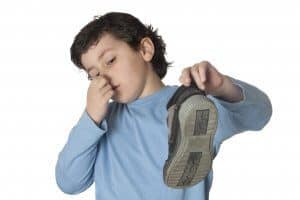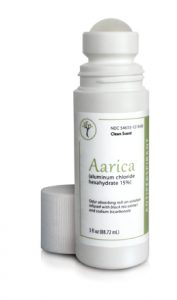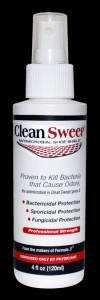
Fast facts on smelly feet
Here are some quick facts that can help you understand the basics of why smelly feet occur:
- Most of the time the odor is caused by bacteria growing on the foot and by moisture build-up.
- While smelly feet is not an actual medical condition (typically), they can cause self-image issues while also potentially hurting personal relationships.
- Having bacteria on the feet is actually quite normal.
- As the bacteria break down oils on the feet, as well as dead skin cells, the decomposition can lead to a bad odor.
How to get rid of Smelly Shoes
Socks and shoes can actually make your feet smell worse by causing them to sweat. Here are some changes you can make to help deal with the issues:
Shoes
Wearing shoes with a breathable fabric can help reduce the prevalence of sweating and moisture. Mesh is a highly recommended fabric to look for when buying shoes.
Plastic shoes will likely only increase the incidence of sweaty feet, and therefore will often leave your feet with a pungent odor.
Socks
While socks can be a cause for smelly feet, they can often conceal the odor until taken off. Sweat-wicking materials are recommended to mitigate potential sweat build-up.
Another benefit to wearing socks is that they may be changed, so the odor build-up does not occur in your shoes.
Alternating shoes and socks
Allowing your shoes to air out will help reduce the sweat build-up.
Having multiple pairs of shoes to rotate is recommended to allow you to air out one pair for at least a day (and who doesn’t need an excuse for more shoes?)
If this change still isn’t doing enough for you, you may want to consider bringing a second pair of socks with you to change throughout your day.
Replacing insoles
There are options for antibacterial or odor-reducing insoles available online and in stores that sell similar footwear insoles. These can help by denaturing the sweat and reducing odor.
If you are already using custom orthotics or do not wish to replace the insoles in your shoes, you can buy disinfecting spray that can be used on your normal footwear. The caveat with this is that these sprays are typically less effective than the specially designed insoles.
Home remedies for smelly feet
While changing these footwear habits can be beneficial, you should also aim to improve foot hygiene where applicable. Most of these habits can be altered in the home, and include some of the following:
Exfoliating the feet
As dead skin cells begin to build on the bottom of your feet, you’ll want to try to cleanse them by getting either a scrub or a pumice stone. This will prevent the bacteria on your feet from feasting on these cells, thus preventing the odor of decomposition.
We recommend that those with especially smelly feet use the pumice stone at least 2-3 times a week, as constant use will regulate the amount of dead tissue on your feet.
Salt soak
Epsom salt soaks can be used to exfoliate the skin and generally improve foot health. To properly prepare yourself a soak, fill a bowl or tub with warm water and stir in about a half cup of Epsom salts until dissolved. Place your feet in, throw on some relaxing tunes (optional), and let them soak for about 10-20 minutes. Dry completely with a warm towel.
Vinegar soak
Like an Epsom soak, fill a container with 2 parts warm water and 1 part vinegar (white vinegar and apple cider are both acceptable), and soak your feet for about the same time (no more than 20 minutes).
Warning: do not attempt a vinegar soak if you have open cuts or sores; it will not be a pleasurable experience, and there will be pain involved.
Antiperspirant

Antiperspirant for the foot
It may seem odd, but putting antiperspirant on your feet can actually be very effective; antiperspirant does essentially mean “no-sweat”.
If normal antiperspirants aren’t cutting it, you can ask your doctor for a prescription for stronger option catered for your feet. Cornstarch is another option you can try as an alternative.
Medical treatments to Get Rid of Smelly Feet and Shoes
If you are at this point in the article, you may have been shaking your head saying to yourself, “but I’ve tried all of these options, and none of them have worked for me.” If this is the case, surgery may be your next step.
Botox
Your other option is botox injections, which injects the botulinum toxin into the bottom of the foot. These are known as plantar injections.
There are a few drawbacks to this treatment however, including but not limited to: pain during the injection, results that are temporary, and necessary subsequent treatments.
These injections can also be useful for reducing underarm sweating.
Iontophoresis
This is a mild treatment that uses an calm electric current, delivered while soaking your feet in water, to reduce the production of sweat on the feet.
Shoe Spray

Outlook on Get Rid of Smelly Feet and Shoes
According to the Institute for Preventive Foot Health, there are about 16% of adults out there who have reported issues with foot odor.
Sudden onset of smelly feet may however be a sign of a potential cut or sore that has been infected, and you should check for signs of these upon noticing an issue. If there are signs of an infection, you should seek medical help as soon as you can, as untreated infections can be extremely dangerous.
You should not have to accept smelly feet, and if any of these options aren’t right for you, there are other prescription options available to you, and you should consult with your doctor about what treatment options are available to you.
How To Prevent Smell From Shoes In Future?
1. Wash Your Shoes Once In Two Weeks
Washing your shoes often is a must or you may not be able to prevent bad smells from it.
Make sure you wash your shoes at least once in two weeks for the best results.
You can wash them with your hands or washing machine. You should wash their insides and get rid of all the dirt as well.
This will help you destroy all the bacteria living inside the shoes which will prevent bad odor.
2. Let Them dry In the Sunlight Properly
Letting your shoes rest in the sunlight is an important step to getting rid of the smell.
After you wash them get rid of the excess water and put them in sunlight.
Make sure the sunlight can inside the shoes, this will help you get rid of the bacteria and germs.
If your shoes ever get wet in the same you can use the same process and protect them from turning smelly.
How can I prevent moisture buildup in my shoes, which can contribute to odor?
To prevent moisture buildup in your shoes and reduce the likelihood of odor, consider the following tips:
- Choose Breathable Shoes: Opt for shoes made from breathable materials, such as leather or mesh. These materials allow air circulation, helping to keep your feet dry.
- Wear Moisture-Wicking Socks: Select socks made from moisture-wicking materials like merino wool or synthetic blends. These socks draw moisture away from your feet, reducing dampness inside the shoes.
- Rotate Your Shoes: Avoid wearing the same pair of shoes every day. Give each pair time to air out by rotating them, allowing moisture to evaporate.
- Use Antiperspirant on Your Feet: Apply foot antiperspirant or a specialized foot powder to help control sweat and moisture. Make sure your feet are clean and dry before application.
- Insert Odor-Fighting Insoles: Consider using insoles with moisture-wicking properties or those infused with activated charcoal or other odor-absorbing materials.
- Allow Shoes to Air Dry: After wearing your shoes, remove the insoles and let both the shoes and insoles air dry completely. Avoid storing damp shoes in closed spaces.
Can changing my diet or hydration habits help reduce foot odor?
Yes, changing your diet and hydration habits can contribute to reducing foot odor. Here are some dietary and hydration tips that may help:
- Stay Hydrated: Drinking an adequate amount of water helps regulate body temperature and can reduce overall sweating, including in the feet. Aim for at least 8 glasses (64 ounces) of water per day.
- Reduce Caffeine and Alcohol: Both caffeine and alcohol can contribute to dehydration, leading to increased sweating. Moderating your intake may help maintain better overall hydration.
- Include Fruits and Vegetables: A diet rich in fruits and vegetables provides essential nutrients and antioxidants, promoting overall health and potentially reducing body odor.

 Your other option is
Your other option is